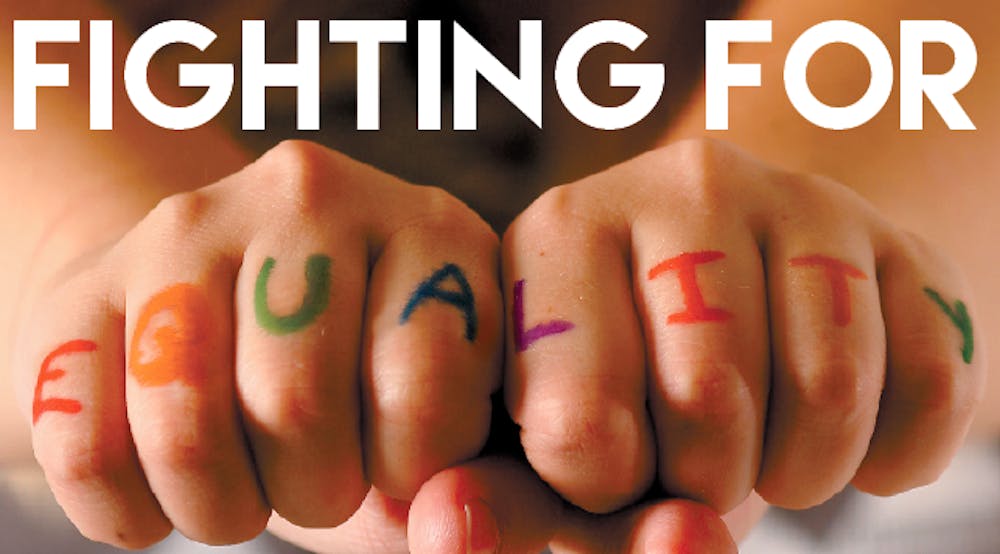Though marriage equality is law, activists stress there is more work to be done
After recently coming out as transgender, Jak Grubbs no longer cringes when being introduced to someone.
The Holland senior now uses the pronouns they, them and their. Feeling comfortable living as a transgender person wasn't always so easy for Grubbs. In high school, after coming out to a friend, they were betrayed after having their identity publicly shared with the student body.
At that time, Grubbs identified as a lesbian, but still felt like that identity didn't fully fit.
"Before college, I knew a lot about gay, lesbian and bisexual," Grubbs said. "I didn't really know what the T stood for (in LGBTQ+) because it wasn't such a relevant thing. That probably attributed to the fact that I didn't come out until now.
"Anybody who's known me knows I've become way more confident. I'm less afraid to be who I am."
When Grubbs was doing research on different sexualities during college, they had a sort of epiphany.
"I finally found something that fit my identity," Grubbs said. "I was sitting in my dorm room and I just started crying. It made so much sense, because I had been struggling with my identity for years."
Now that same-sex marriage is legal in all 50 states many people think the fight for equality is over, Grubbs said. Though everyone can marry whom they choose, the Supreme Court ruling is the beginning of a longer battle which is evident in society and at Central Michigan University.
Andrew Blom, philosophy and religion faculty and organizer of Speak Up Speak Out panels, said marriage equality is one of the biggest and most tangible signs of progression in the U.S. Religious freedom act laws, Blom said, preserve the ability for people to discriminate against the LGBTQ+ community. The most recent of these exemptions was written into adoption laws in Michigan, which allow state-funded adoption agencies to turn away parents because of any moral objection the agency may have.
"It doesn't say anything specific about LGBTQ+ people, but it creates a window for people to (discriminate)," Blom said.
Director of LGBTQ Services Shannon Dettore echoed Blom's concern, saying until people are willing to learn about others' identities and understand them, no policy can legislate acceptance.
"It’s not as if all people against (marriage equality) were suddenly supportive," Dettore said. "We still know these negative attitudes are out there."
Dettore stressed the need for an inclusive anti-discrimination act in Michigan, because LGBTQ+ people can still be discriminated against with housing, employment and violence.
"While marriage equality is great, folks can get married and then go to their job on Monday and get fired," she said. "But (policy) won't make people feel more safe. It won't mean that if you're my waitress and treat me badly that I don't still internalize that and have to battle through it."
CMU has progressed in some aspects, Dettore said, but every individual experiences campus and Mount Pleasant differently. When she was a student here, she was walking to class and read sidewalk chalk that read "Faggots aren't welcome here."
Stepping into her role as director in 2008, Dettore said a lot of students who visited her office confided that they didn't feel safe in classrooms, residence halls or just walking down a campus sidewalk, because of their sexual identities.
"In about 2010, we started seeing a shift to where students said they were feeling safer on campus, but maybe not off campus," she said. "It's very individual in the ways you navigate your ‘outness.’ Transgender folks are experiencing campus much differently than lesbian or gay people are."
As a student, Grubbs has had many awkward conversations with professors, regarding their name and pronouns. While Grubbs received mixed reactions, they said no response has been outright negative.
Part of Dettore’s role on campus is to train CMU faculty and staff on how to create an inclusive environment for students. However, these training sessions aren't mandatory.
"Our hope is to give them the tools for an inclusive classroom or office setting," she said. "We have conversations around what it is students, faculty and staff that identify as LGBTQ might be facing. Really it's to be an ear for (faculty)."
For students, there are registered student organizations that work to help educate campus about LGBTQ+ issues, like Spectrum, a social organization, and Transcend, a group for trans and nonbinary people. Grubbs said anyone is invited to certain events these groups hold, like Trans 101 sessions and ally meetings.
"We have some great activists who strive to educate," they said. "There are a lot of growing opportunities for everyone."
While people at CMU and the larger society move toward acceptance and understanding of lifestyles, genders and religions that are unlike their own, Grubbs said challenges remain. In many ways, society’s conversation about how to view differences in gender and sexuality is just beginning.
"Marriage equality was something America was focused on, but there's more," Grubbs said. "The conversation is going to have to continue until things are changed."




